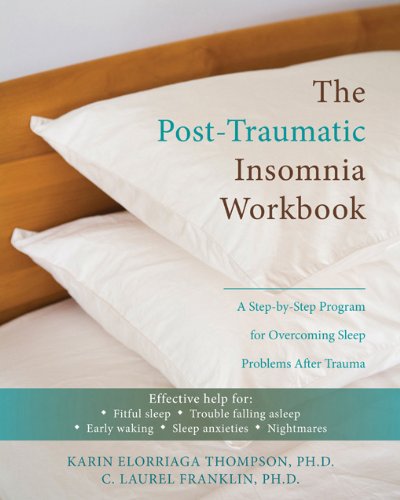"This workbook is a user-friendly self-help guide to improving sleep for trauma survivors who have developed sleep problems. I particularly like the fact that the book uses principles for sleep improvement that are empirically based, and presents them in a stepwise fashion that users will find easy to follow. While the primary audience of this book is trauma survivors themselves, I believe that trauma therapists will also find it valuable as a resource they can use directly or recommend to their clients."
—David W. Foy, PhD, professor of psychology at Pepperdine University in Santa Clara, CA
"Enhanced with clear worksheets and easy-to-understand, step-by-step instructions, Thompson and Franklin provide a procedurally adept, evidence-based, authoritative self-help guide to mastering complex insomnia and nightmares associated with PTSD."
—Kenneth L. Lichstein, PhD, professor at the University of Alabama and director of the Sleep Research Project
"This workbook provides a useful framework to guide therapists and self-help efforts. A number of useful tools for assessment and monitoring are included. The step-by-step program comprehensively addresses the thoughts and behaviors that tend to perpetuate sleep problems that are associated with PTSD."
—Thomas A Mellman, MD, professor of psychiatry at Howard University in Washington, DC, and program director of its General Clinical Research Center
"This workbook is a masterpiece and is something that mental health providers and patients have needed for a long time. It clearly provides a practical and systematic approach to addressing troublesome symptoms associated with PTSD. Mental clinics are swamped with combat veterans who need more than a pharmaceutical sleep aid."
—Dennis L. Reeves, PhD, retired commander in the United States Navy and clinical neuropsychologist
"The authors have done a masterful job of addressing the various types of sleeping problems that can wreak havoc in the lives of trauma survivors. This extremely well-organized and clearly written book breaks down the complex problem of getting a good night’s sleep into simple but meaningful steps. It provides an abundance of solid suggestions and alternative ways that survivors can help themselves. This superb guide to overcoming sleeping problems is chock full of information and contains many excellent worksheets and innovative approaches to the make-or-break issue of adequate sleep. I highly recommend it for clients and mental health professionals alike."
—Aphrodite Matsakis, PhD, post-traumatic stress disorder specialist and author of I Can’t Get Over It
"To sleep, perchance to dream—without nightmares, racing thoughts, or interruptions. This book uses a variety of exercises to increase the likelihood of sleep while challenging habits that interfere with restful, stressless sleep. The author also provides ways to lessen repetition of trauma-related nightmares so that dreaming can again become a time of restoration, not rumination. This book will be a source of gratitude for many trauma survivors as they relearn how to sleep and, perchance, to dream!"
—Mary Beth Williams, Ph.D., LCSW, CTS, author of The PTSD Workbook



